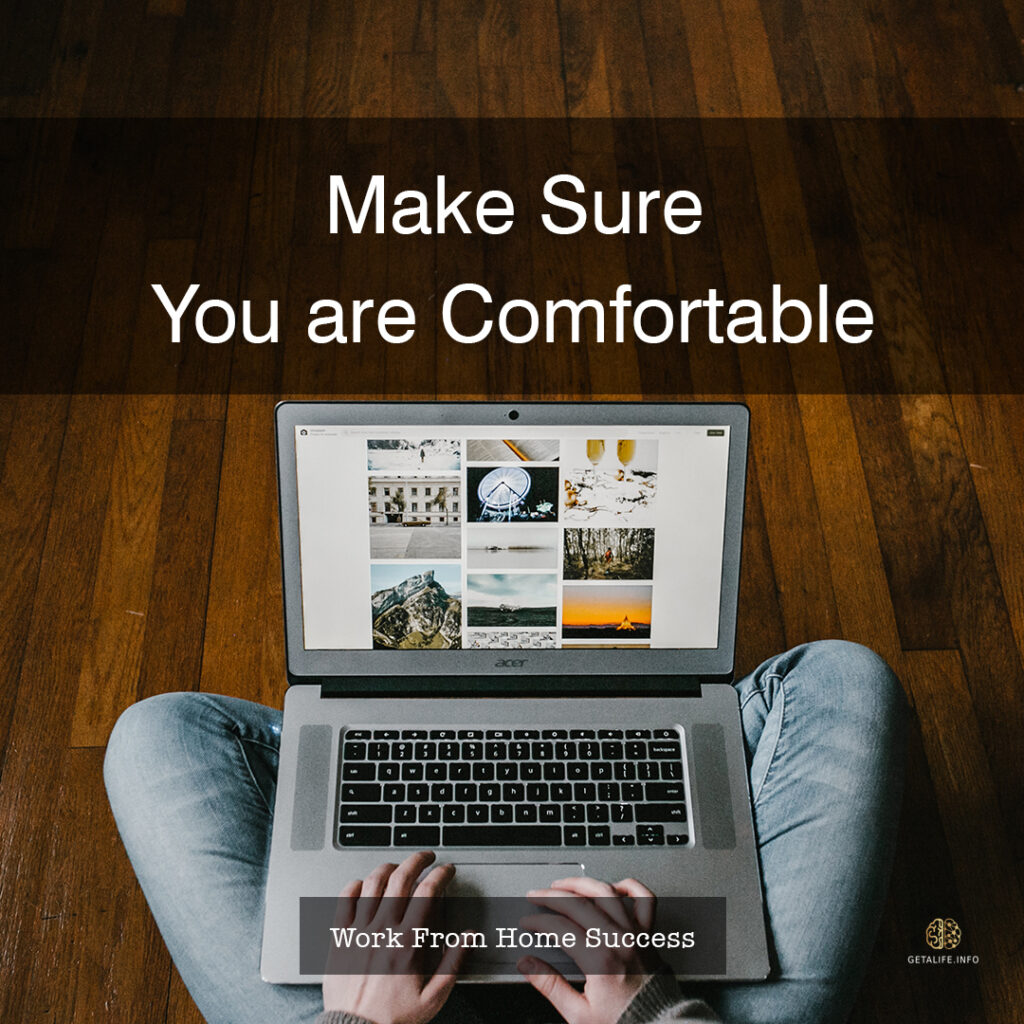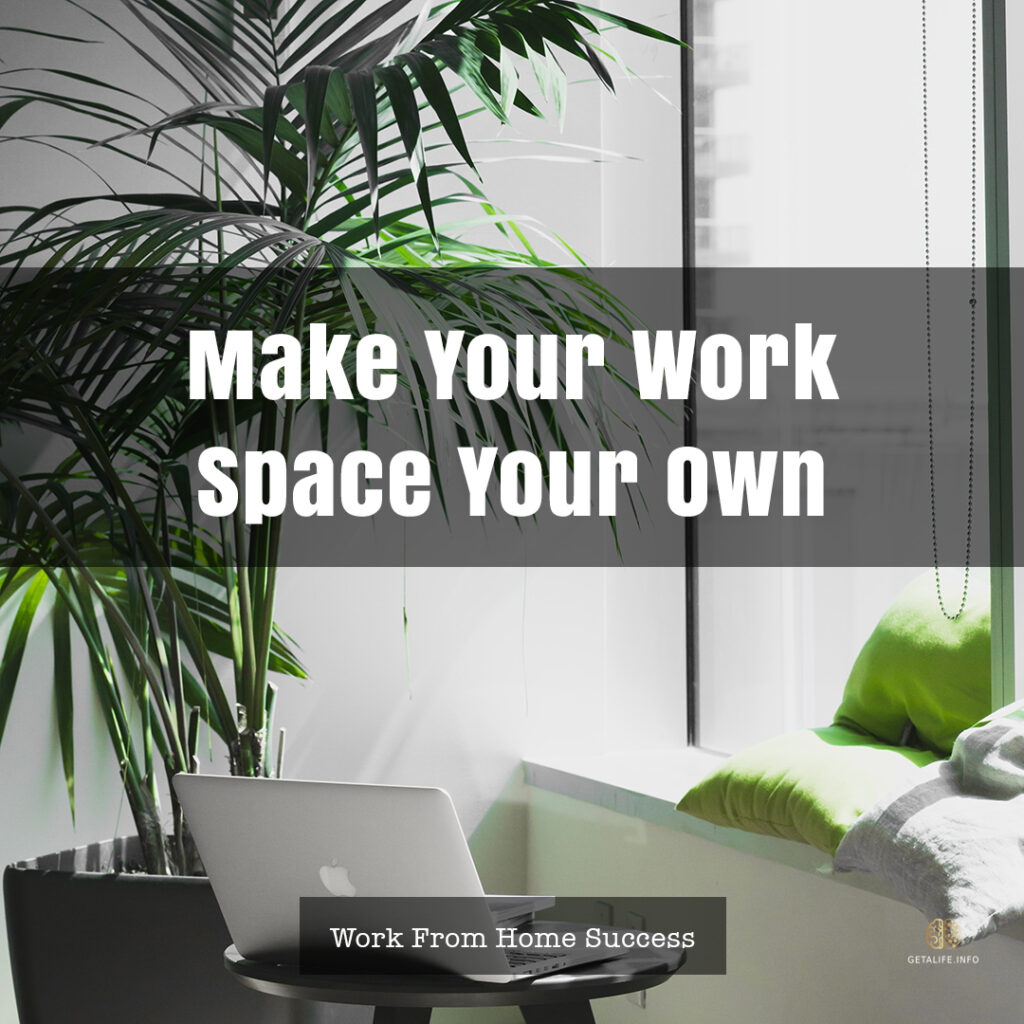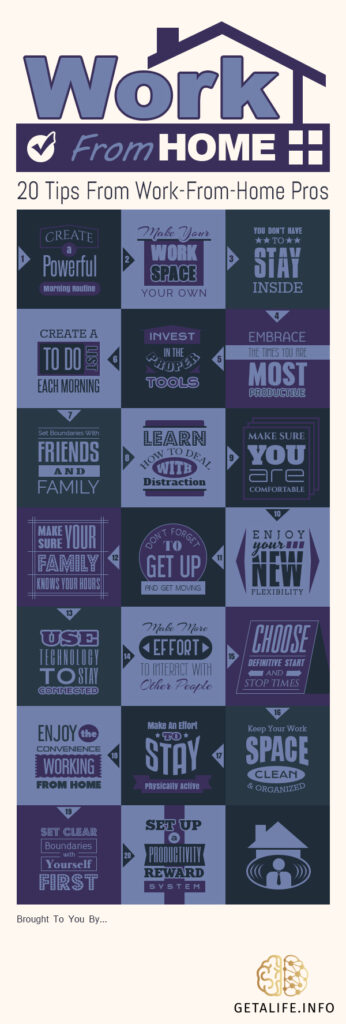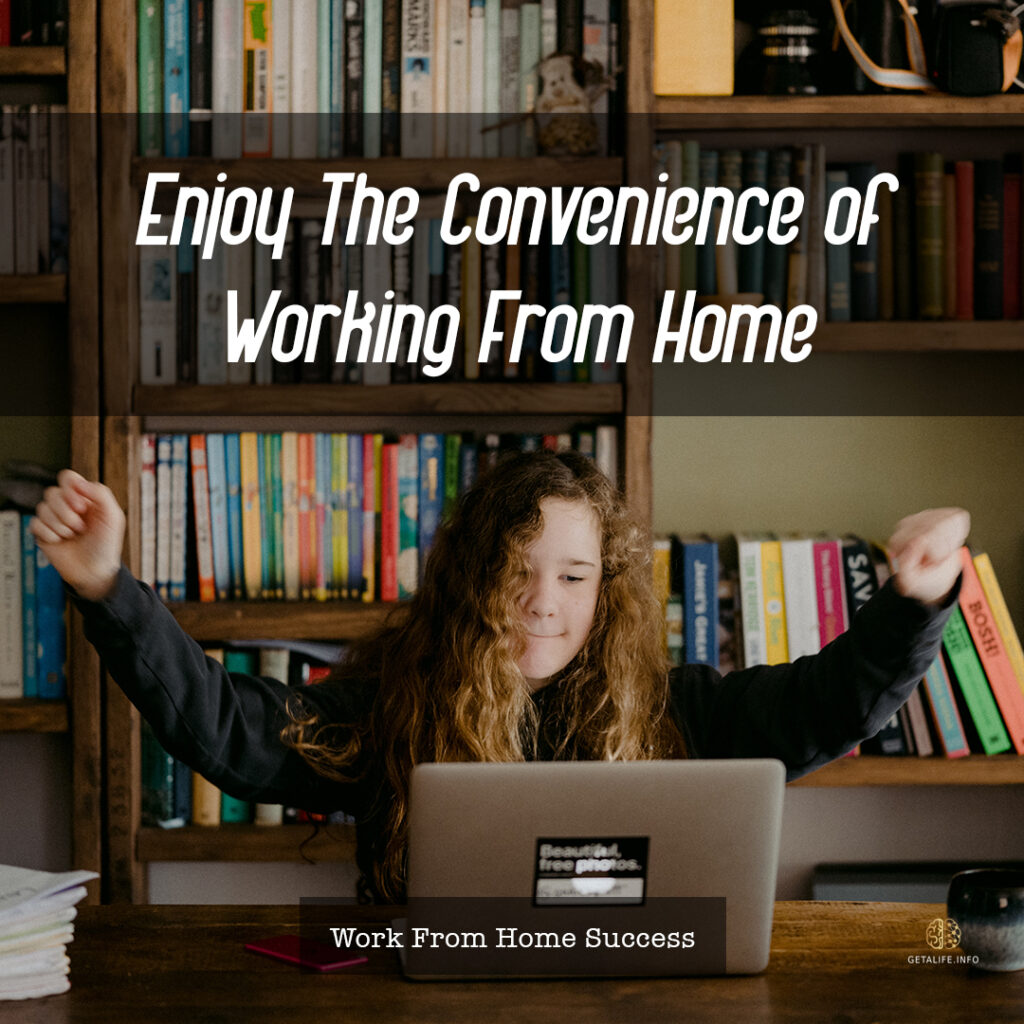
The Work from Home Professional: Staying Productive & Motivated When Working from Home
Table of Contents
- Introduction
- The Benefits of Working from Home
- The Pitfalls of Working from Home
- The Work from Home Atmosphere
- Work from Home Productivity
- Conclusion
Introduction
Want to bet you have a dream in common with more than three-quarters of those who are employed?
In 2019, LinkedIn surveyed 2000 hiring managers. They discovered something interesting about their new hires: 82% of those in the workforce admitted to wanting to work from home at least one day a week. 57% expressed a similar desire for at least three days a week.
The startling truth is people want to work from home whether telecommuting, doing remote work for a large company, or taking the plunge by setting up their own home business. After all, it seems like the perfect answer to the age-old problem of how to balance home and work life. By combining the two, you get the best of both worlds every day…right?
It’s not quite that easy. Working from home can be an exciting and even life-changing shift in the way you do business. The key to success lies in doing exactly what you are now: taking the time to learn how to optimize the experience. Congratulations! You’re already on the right track!
Whether you’re lucky enough to be already working from home or are just considering it, this book will walk you through a few things about working from home that you might not have realized.
First, we’re going to visit some of the benefits of working from home. You’re going to find out there’s a lot of good reasons why you should take the plunge and indulge in working remotely.
Of course, we also have to spend a little time on the pitfalls if we want to be fair. There are a few worthy of note, especially if you want to have the full picture of what this kind of lifestyle entails.
From there, you’re going to learn how to create the proper atmosphere if you want to work from home. The ambiance truly does matter, especially if you want to be productive, which leads us to the last point where we’ll discuss several tips on how to get the most out of your work from home experience.
So hang on, we’ve got a lot of information coming your way. It’s going to be a thrilling ride!

The Benefits of Working from Home
Working from home is one of those things people dream about doing. There’s a lot to love about being able to get paid for a day’s work all while never leaving the comfort of your own home.
But there is a plethora of other benefits to working from home, extending far beyond being able to be near all your stuff. Let’s take a closer look at some of those. Want to bet there might be a few items on this list you haven’t even thought of yet?
Your Body Will Thank You Have you considered how much your health and fitness can be addressed by working from home? This means you can create healthy meals for lunch. It’s also easier to find time to exercise. Hey, if you want to, you can set up your workspace with a standing desk or an exercise ball to sit on without having to get permission from your boss. Want to get caught up on reading those reports while on a treadmill? Go for it.
You Can Grab Opportunities as They Arise Got a reply to an email kind of late? Found out about something you need to jump on now? With your office right there at home, you can quickly grab whatever you need to deal with the unexpected quickly and easily. You’ll never be caught floundering because what you need is across town at the office.
Those Dollars and Cents While there are some costs to working at home, for the most part, the savings outweigh those easily. With no gas money needed for commuting, childcare fees for long hours at daycare, or even the investment in a work wardrobe, you wind up with more money in the bank account and less heading out the door.
Gotta Love Productivity Offices are great places for distractions. Co-workers, random meetings, just the daily noise of work can keep you from being able to focus the way you need to. At home, you can set up the optimal environment for getting stuff done. For example, you can have music or not as you like it in the background. You can also set up blocks of time without interruption at all. Imagine how much you’ll get done under those conditions!
Quality Time with the Kids Been feeling like you never get time enough to enjoy the kids while they’re still at home? Now there’s no excuse for missing out on the family game night or a quick game of ball.
Can’t Beat that Commute Let’s face it, nothing beats a commute time of nothing. No traffic, no paying for parking or gas. You can even sleep in longer all because you’re already right where you need to be.
Furry Co-workers Studies have shown how much just petting an animal can reduce stress. Working from home means having your favorite friend right within reach, helping to keep your work environment calm and comfortable. What’s more, your pet will appreciate the extra attention as well.
No More Casual Fridays Every day means wearing what you want instead. Your home, your dress code. Of course, you might still want to put on pants at some point or another, especially if you’re teleconferencing.
Incredible Flexibility While working remotely might not allow for as much flexibility as you like, you’re still going to find working at home has more ‘give’ to the schedule no matter what. Flexibility means adjusting your work hours to your own schedule sometimes or deciding how you want to tackle the day. Also, it’s a lot easier to deal with the household things when you’re already at home. Meaning you’re not having to take time off of work if you’re waiting for the plumber to show up. Not to mention taking care of a sick kid just got a whole lot easier.
Your Day Starts with Less Stress Have you ever considered just how much you scramble to get to work in the morning? You wake up, rush to shower and eat, and get out the door. All the way there, you combat traffic and then still fight to find parking or snag a seat on the train. By the time you get to work, you’ve been up for hours and all of it has been in relentless motion. Working from home means being able to start the day from a more relaxed place. You haven’t had to deal with all these outside stressors and it doesn’t have to feel like you’ve run the gauntlet just to get to your desk.
Your Work Environment is Your Own Have you been fighting to get a corner office for a while? Now it’s up to you to create just what kind of office you want. Need natural light or want to add in LEDs? No problem. Would you rather sit with your feet up using a laptop from the couch? Go for it. You have full control over where you’re working. Install all the plants you want or set up with multiple monitors. Whatever you want or need is yours. No more cubicles unless you want one.
Chores Get Done Working from home means you can slip in a few other extras from time to time. Start a load of laundry when you stop for lunch. Or take a few minutes to take care of the squeaky door. Being at home means you don’t have to have any more crash-and-burn cleaning marathons on the weekend. Tidying up is a great way to stretch when you pause to take a break.
You Can Hear Clearly Now One of the hardest things to do in any workplace is to return a call when there’s a lot of background noise. How many times have you been caught repeating yourself or worse, asking the client to repeat themselves because there’s too much chatter just outside your door or in the next cubicle? When you work from home, you can set up a quiet spot for returning calls—no more noisy distractions.
You Can Indulge in an Office Romance Between work and commute, you spend quite a few hours away from home normally. Working from home means you get to see the people you love most a lot more often. Breaks just to say hi or steal a kiss give you random bits of happiness to look forward to. Even when you’re working, it doesn’t mean you have to be apart. Maybe your significant other is curled up in the corner of the same room reading or doing work of their own. At the very least, your boss isn’t going to know when you’re texting your spouse anymore.
Job Satisfaction The very fact you’re being permitted to work remotely should tell you the work you’re doing is good. It also says a lot about what your employer thinks you’re able to accomplish and how much they trust you. If you’re working in your own business and have things to do, it also says a lot about what your clients think of the work you do. In other words, you have reason to be proud. As a result, more than any other work situation, you have a lot of reason to feel job satisfaction. People who work from home are fantastic folks. Go them!

The Pitfalls of Working from Home
Of course, nothing is perfect. While there’s a lot of terrific aspects to working from home, there are a few pitfalls you need to be aware of as well.
Willpower Without a boss looking over your shoulder or peers on hand who are likewise busy, working can seem challenging to start in motion. Sitting down and making yourself work, meeting deadlines, and accomplishing what you need to takes a lot of willpower and all of it is going to need to come straight from you. Sadly, willpower is a finite resource and if you’re tired, discouraged, or overwhelmed, you’re going to find it harder and harder to get started. Eventually, this can become a problem where you’re not getting anything done at all.
Being Scheduled The only way to successfully work from home is to establish a routine. Think about it. When you go to work, your routine is typically determined for you. You’re told when to be there and when you can leave. There’re guidelines about breaks and time off. At home, you lose all this structure and these decisions fall into your hands. If you don’t recreate your routine, you’re going to find yourself not getting very much done at all. Breaks will enlarge to take over the day. You won’t start when you should and might wind up working all night to compensate. Things get messy.
What Was That? Missed calls, missed opportunities abound. If you’re not proactive about keeping up with communication, you might find yourself left out of the loop entirely by co-workers or clients. Without a receptionist to catch calls for you, something important can easily languish in your voicemail for hours before you notice it.
Binge-Snacking Eating for energy, for boredom’s sake, or just because there’s food so near at hand can lead to out of control snacking. This isn’t good for your health or waistline.
Unintended Naps With no one to keep you alert, you might very well nod off over your work, especially if you make yourself too cozy on the couch or are working in bed all tucked in.
Same Old Same Old When you don’t go into work, you see a lot of the same four walls day in and day out. It’s very easy to grow bored with your surroundings or feel too much like you’re penned in at home and never get out. This can lead to anxiety and depression over time.
Equipment Issues Your stuff, your problem. If you have a computer problem, it’s now yours to solve. You’re going to have to act as your own IT person even if your company provides phone support. There isn’t someone coming down from the computer department to deal with the paper jam in your printer. Speaking of the printer, all equipment is up to you. You’re going to have to stock your office so second monitors, a decent pencil sharpener, even extra paper clips are all yours to find or maintain. It’s not like you can lean over and ask someone from the next cubicle to lend you a stapler.
Environmental Issues Speaking of equipment, what about the rest of your surroundings? Do you have a desk? An ergonomic chair? Good lighting? A dedicated office space? This too is all up to you.
How Many Bars Do You Have? Working from home also leaves you at the mercy of less than glorious Wi-Fi speed unless you upgrade your plan. Updating your Wi-Fi can mean extra cost as well. Sadly, reliable internet is an absolute must. You cannot share documents or teleconference properly on low bandwidth and your phone can’t always make up the deficit.
Slowdowns Getting a response from the boss might take longer when you’re asking questions from home. So too might access to the documents you need or to work other people are doing on the files. This can very quickly slow down progress on whatever you’re working on.
Concentration Working from home can lead to a whole slew of outside distractions from the dog who wants to go out to just noise in general or interruptions from other members of the family. There is always something to keep you from working. It’s up to you to try and find a way to maintain your concentration even when things are falling apart around you.
It’s a Little Too Quiet On the other hand, especially if you live alone, things can get a little too quiet. You’re used to having other people around you, especially other co-workers. Without this kind of social interaction, it’s normal to feel a little lonely. Even if you have family around, just having conversations with people who have something more to talk about than home life is a vital part of the day. Your brain needs stimulation, meaning you’re going to have to work harder to maintain positive social interaction.
Finding a Balance Speaking of the Work/Family thing, how are you balancing things? When you’re working from home, it’s easy for things to get skewed. Either you’re distracted by your family and the work isn’t getting done or you’re ignoring your family and putting in too many hours at work simply because your office is right there and it’s easy to keep working long past quitting time. Achieving this balance is a challenging exercise and takes a lot of intentionality to maintain.
Staying Motivated You’re not going to get as much feedback from co-workers or clients when you work from home. You can start to feel like you’re isolated, doing work no one appreciates or even needs you to do. Motivation falters and as a consequence, you find it harder and harder to sit down and do what you need to do. Stay too long in this state of mind and you might find yourself thinking of quitting altogether.

The Work from Home Atmosphere
Much as you might want to, you really can’t work from any old place. You’re going to find out some areas of your home simply aren’t conducive to good concentration or even physical comfort. Also, there might be technical issues you hadn’t thought of, such as a lack of outlets in that perfect corner nook or the Wi-Fi not reaching to the spare room where you’ve set up an office.
The key here is to plan your workspace and to work out the bugs before you even sit down and start working. By creating a dedicated space to get things done, you’re going to find you waste a lot less time looking for things you might need. More importantly, you’re setting yourself up for success by telling yourself your work is important enough to have a space all its own. Remember, you’re important enough to be comfortable in your own workspace.
Let’s look at a few things you can do to create the optimal atmosphere for getting things done.
What Do You Need? It’s impossible to set up a workspace if you don’t know what you need to be productive. With this in mind, your very first step needs to sort out those details. Start by making a list of the tasks your job requires you to do. Next, make a list of items you’ll need to complete those tasks. Include absolutely everything from a desk down to the kind of lighting you’ll find most helpful. This should be fairly detailed, as this list is going to become the blueprint for what you do next.
Location, Location, Location! You can’t be productive if you can’t find a comfortable place to work where the lighting is right, and you have what you need to work. While you might be thinking you can work from anywhere so long as you have a laptop (and this might even be true), having a dedicated office space is going to help you psychologically take working from home seriously. With this in mind, you’ll want to scout a location. Take your laptop and try working in various places around your home. A little experimentation should bring you to the place where you feel most comfortable working.
Lighting Matters There’s a lot of discussion on lighting, starting with the need for natural light. Studies have shown people just do better psychologically when exposed to natural light. That said, you’re also going to want solid artificial lighting. You need something bright enough to work by, but not placed in a way to create uncomfortable glare. Again, you might have to experiment a little to get the effect you need.
A Dedicated Phone You’re going to need to separate work from day to day life as much as possible. To reduce distraction and also to keep productivity high, have a phone line dedicated entirely to the business. It doesn’t have to be a landline. An extra cell phone works just as well.
Everything in its Place Being organized is going to optimize your productivity. Clutter will always slow you down. When designing your workspace, make sure you have enough storage solutions. You’re also going to want to organize these spaces, so you don’t have to hunt in a half dozen drawers to find a new pen or sheet of stamps.
Clear Your Desk Now that you have things put away, keep them there. The more clutter you allow on your desk, the harder it will be to concentrate. Set up spaces for files and papers and keep the mementos and knick-knacks to a minimum. Be sure to put things away as you use them and try to clean the desk off completely before you quit for the night. The less you leave on the surface at the end of the day, the more productive your morning will be.
Everything Within Reach One final word on all discussing the things you need as you work. By practicing a simple rule of making sure every item you need is easily within reach, you’ll never waste time when getting things done. Any time you have to get up to fetch something, even if it’s just across the room, your concentration gets broken. By having everything at your fingertips, you keep going with barely an interruption. You’d think this doesn’t matter, but it does. Did you know it takes between 20 and 40 minutes to regain concentration every time you lose it?
Firm vs. Fluffy Your office should have a variety of furniture if you have the space for it. If you’re looking to add in a chair or couch to work from when not at your desk, keep in mind the rule of making sure the furniture isn’t too comfortable. Something cozy is apt to lend toward sleepiness and can kill productivity. On the other hand, keeping things too rigid and hard will lead to aching muscles and spine issues if you spend too much time sitting there. Look to strike a balance between the two extremes.
Stand Up Straight Want higher energy? Try standing at your desk. In all this discussion on desks, you might want to use a standing desk for at least part of the day. Standing desks have proven to be beneficial to your health in numerous ways and help to keep you feeling more alert throughout the day.
Ergonomic Solutions Speaking of places to sit, consider a desk chair (if you’re not using a standing desk) which has been designed for extended use. Having an ergonomic chair will go a long way toward keeping you from back and neck pain (one of the most frequent complaints by those who work at a desk all day).
Separators This might be a little harder to define. Psychologically, you need to separate your work and home life if you expect to be productive. Multiple-use rooms can make this very difficult. If you have the clutter at home, such as laundry needing to be folded or are trying to have the kids do their homework in your office, you’re going to have difficulty in focusing on your work. Your office needs to be the place where you get your job done—end of story. Think about how you can make this divide. Can you put the laundry somewhere else? Is there a different spot where the kids can do their work where maybe you can still supervise them without interrupting your work? Even putting up a decorative partition dividing your workspace from the rest of the room can set a boundary telling the rest of the family (and reminding you) that this is your space to work.
Pick a Timekeeper Sometimes you might find you need a timer to keep yourself on track. Make sure you have a timepiece you can easily use for this purpose. You don’t need anything fancy. There are many timers designed for office work, especially if you’re into using the Pomodoro technique for getting things done.
Equipment Designed to Win Do you work better with two monitors over one? Do you find you do better on a desktop computer or a laptop? Don’t try to make do with old, outdated equipment or things which will only frustrate the more you decide to use them. Investing in the tools of the trade is just part of working from home. Get what you need to get the job done comfortably.
Ambiance Your brain will thank you if you put a little attention into the décor of your workspace. Having art or photographs on the wall and something meaningful in your office will make the room feel more like yours and less like a sterile space without personality. The room should reflect you right down to the color scheme. You want to enjoy working in this space.
Fidgets While it might seem silly to have a selection of small toys lying about, fidgets of all kinds have been proven to help stimulate creativity when blocked. Having some modeling clay, a collection of things to build with, or something to draw on along with some markers or crayons will give you a creative outlet when you need one.
Tech Dumping Trying to work can be difficult when you’re constantly being distracted by your electronics. Put a basket near the door of your office where you can drop your phone or tablet when you come into the room. By putting a little distance between yourself and your tech, you will find yourself reaching for it less often and more likely to ignore it altogether. On the other hand, you’ll still hear your phone ring just fine from across the room and have plenty of time to answer if someone calls.
Closed Door Policy Any workspace should have a closed-door policy. Talk to your family about respecting a closed door as a signal that you absolutely cannot be interrupted. Use the closed-door system sparingly, only for times when you need optimal concentration or when you need to videoconference or be on the phone. Using it all the time tends to backfire. Your family gets so used to seeing the door closed they stop thinking of it as a barrier and will start interrupting again.
Family Rules Speaking of policy, you might want to set up a few other rules for your family about noise levels while working or how you want to be interrupted (because let’s face it, you will be interrupted). Making your rules clear will help to keep the work environment optimal at all times.
Wired for Success No matter what, you’re going to need a space with plenty of outlets (and power strips with surge protectors for computer equipment) and optimal Wi-Fi. Adequate wiring is a safety issue. The Wi-Fi should go without saying.
A Question of Air Quality Air quality is important. You’ll think better the cleaner the air you’re breathing. You will want to assure proper airflow first, no matter what. Windows that open are always great for the months with warmer weather. An air purifier will keep the air you breathe from becoming too stale if the room is closed off, as will a selection of house plants which also add to the ambiance.
A Word on Stress Relief Your space should have something to help with stress when you’re overwhelmed. No, we’re not telling you to invest in a wine bar. On the other hand, having a shelf full of books or a comfortable place to curl up for a nap can help you unwind when you need a moment for yourself. Or try a yoga mat or exercise ball for when you need to stretch.

Work from Home Productivity
The prettiest workspace in the world is nothing if you can’t get things done there. You’re going to need to figure out the best way to be productive from home. Staying productive is probably the most challenging aspect of working remotely. For one thing, all the self-help books in the world can’t give you the one thing you need more than anything else: a clear plan on how to Get Stuff Done.
On the other hand, you can figure out what things work best for you and create your own personal plan that will leave you feeling accomplished at the end of the day and not frantic because you fell behind. Again.
How to do this? Start with the tips at the end of this chapter. From this list, you’re going to want to try everything here at least once. Keep an open mind and see how you feel as you perform each task. Some things are going to feel right and will send you straight into a flow state where you’ll get things done. Others might not work at all. The key here is to try until you have a clear picture of which things work for you.
Once you know these things, the rest is simply a matter of repeating the items which were proven to work best.
Just as a side note? Some of those things which didn’t work might be off-putting because you’ve never thought a certain way before or done things in that order. Before discounting them completely, ask yourself why the tip made you feel uncomfortable. It might be you simply need to give it another go when you’re in a better headspace for it.
Remember what matters most here is the outcome. If you’re getting things done, you’re doing it right. Now let’s look at those tips.
Rise and Shine Starting the day early will help you feel more productive. It also ensures you’re fresh when you sit down to work. Psychologically, starting work first thing in the morning sets the course for the day and gets you going on a positive note.
Treat Working from Home Like Work This should go without saying. Too often though, the fact we’re at home tends to feel more like a vacation, especially if you’re not used to the idea. The key here is to establish actual work hours as if you were leaving the house to go to work. Dress in work clothes and then ‘go’ to your office to start the day. Now when you sit down, you’re in the right headspace to get things done.
Use Your Commute Time Remember how you were thinking you’ve saved all kinds of time by not commuting? Why not be intentional in how you use it? Because you’re already used to getting up a little earlier and using a certain portion of the day in the somewhat unproductive time involved in commuting, you might as well stick with the same schedule – with one notable difference. Now instead of leaving the house for your ‘commute’, take this time for yourself. Why not exercise or listen to an audiobook? Or spend some time outside playing with the dog or indulging in a little fresh air and sunshine just for yourself? Set a timer for your ‘commute’ to signal when it’s over, sit down to work rested, relaxed, and ready to start the day.
Create a Digital Barrier There needs to be a point where you become strict about your cell phone. Why? Because it’s one of the biggest distractions for people who work at home. As mentioned in talking about your workspace, having a place near the door where you can set your phone will keep you from checking it too often. Here’s where you need to build the habit of dropping your phone in the basket when you sit down to work.
The Dreaded Chore List When you’re at home, it’s easy to get caught up in doing household stuff when you’re supposed to be working. Your best solution? Ignore it and only deal with cleaning, laundry, and other dreaded chores during breaks or before or after your work hours. This way you don’t suck the productivity out of the day. On the other hand, if those unwashed dishes are going to drive you crazy all day while you try to work, then by all means stop and get them out of the way if only to give yourself some peace of mind.
Leave Home Sometimes working from home can feel pretty isolated and lonely, especially if you’re used to seeing co-workers every day. A change of venue can bring productivity back up. Head out to a coffee shop for a while or work outside enjoying nature for a change of scene?
Overestimate It’s hard to know just how much you can get done in a day until you try. When working from home, you’re going to want to pay attention to what kind of schedule you set up for yourself. Always schedule more than you think you’ll get done. Why? Because you’re going to find you’re more productive at home and you’re very likely going to get more done than you thought you would. This way you always have something to do. Besides, what’s life without a little challenge now and again?
Drop Social Media Nothing kills productivity like social media, especially when you don’t have a boss looking over their shoulder to see what you’re doing. Since it’s up to you to be productive, it’s also up to you to kill distractions. Shutting down social media during your workday will help you to get the most done with what time you have.
Schedule Downtime Of course, you can’t continuously work without stopping. To keep from skipping meals, missing breaks, or just turning into a workaholic completely, schedule time off on your phone. Set reminders to remind you when it’s time to take a break.
Hit Up Your Productive Times Everyone has a particular time of day when they’re the most productive. If you’re working for yourself, it’s an easy matter to adjust your workday to make the best use of those times, especially if you’re a night person and get the most done after dark. If you’re working remotely, try to schedule tasks for the optimal time, giving yourself lighter tasks when you start to drag. Thankfully, this is so much easier to manage at home than when you’re at work with the boss keeping an eye on you.
Go with the Flow It’s already been noted you should set regular work hours. At the same time, never discount inspiration. If you get a wild, fantastic idea in the middle of the night, by all means, jump on it. This is one of the advantages of working at home: the ability to work whenever you need to.
Prep Snacks You are worried about how close the kitchen is to your office? Before settling in to work, why not prepare a few healthy snacks to munch throughout the day. You’ll be less likely to grab for the chips if you have something else just as easy to snag when you get the munchies.
Make Your Meetings…Healthy? When you have phone meetings, consider grabbing your Bluetooth and taking a walk. By putting yourself in motion, you’ll gain the benefit of exercise while at the same time stimulating creativity as exercise increases cognitive function. Need to take notes? There’re apps for your phone you can use for this such as Evernote.
Set up Tech Before you even start work, make sure you’ve downloaded all the apps you need (such as Zoom, Asana, Trello, etc.) and know how to use them. This way you won’t be floundering with the tech when you need to get things done.
Make Friends If you’re working remotely with other remote workers, it’s worthwhile to build relationships if only to make work processes smoother between you. The added benefit? You’ll feel less like you’re isolated and alone.
Create a Playlist Hey, it’s your home, so you can use your playlist. Put on whatever music will get you going. You can even create playlists to reflect your day just to keep things fun!
Do Laundry You might want to rethink this chore if you were planning on setting this aside for when you weren’t working. Why? You can use laundry to time blocks of work. An hour on the washing machine means you need to get up and move around a little when you switch things to the dryer. This keeps you active and ensures a break once in a while.
Schedule Everything If you want to be super productive, put every single thing on your calendar from tasks to breaks to time with your family or doing chores. By having every second of the day set out on your schedule, you’re more likely to be productive and get things done with less room for distractions.
Become Goal-Oriented Don’t focus on how many hours you’re working as it’s not necessary. What you want to keep your eye on is how much you’re getting done. Measure productivity by the completion of your projects, not the hours in a day. Finish a project early, take the rest of the day off. You deserve it!
Remove Distractions This is probably the most important thing on this list which is why we’re leaving on this note. It’s up to you to silence any distractions around you which keep you from work. You have to take control of your work life at home, starting with setting solid boundaries so you can get things done. Set rules and make things very clear to those around you when you’re working and when you’re not. Then do what you need to in order to protect your work time, whether this means shutting your door to the outside world or using noise-canceling headphones to quiet your world. Once you have this under control, the rest will all fall into place fairly quickly.

Conclusion
Not everyone gets a chance to choose whether or not they work from home. Sometimes circumstances dictate your work location. When this happens, the key is to make the best of things. If you’re lucky enough to be working from home, then use the skills we just talked about in this book to get the most out of the experience.
By now, you know the benefits as well as the pitfalls. Better yet, you have a clearer idea of how to create a workspace where you’ll be able to get things done. Even better, you’ve already learned how to get the most out of your workday.
Now it’s time to put all this information to work for you.
Keep in mind, things might be a little rough at first. It takes time to adapt to an entire change in the way you do things, especially if this is something new you haven’t tried before. Be patient with yourself as you learn and give yourself room to make mistakes. When this happens, it’s key to take a moment to explore what you’ve learned from the experience, and more importantly, keep going.
Once you settle into the new routine – well, watch out world! You’re going to find out just how amazingly productive you can be when you take control of your workspace. Working remotely or working for yourself will have the same outcome: a joyful success in a venue where you have the power to control how and where you work.
It’s a pretty awesome place to be.
To your success, Brian.
Find out more and get the full course at https://getalife.info





